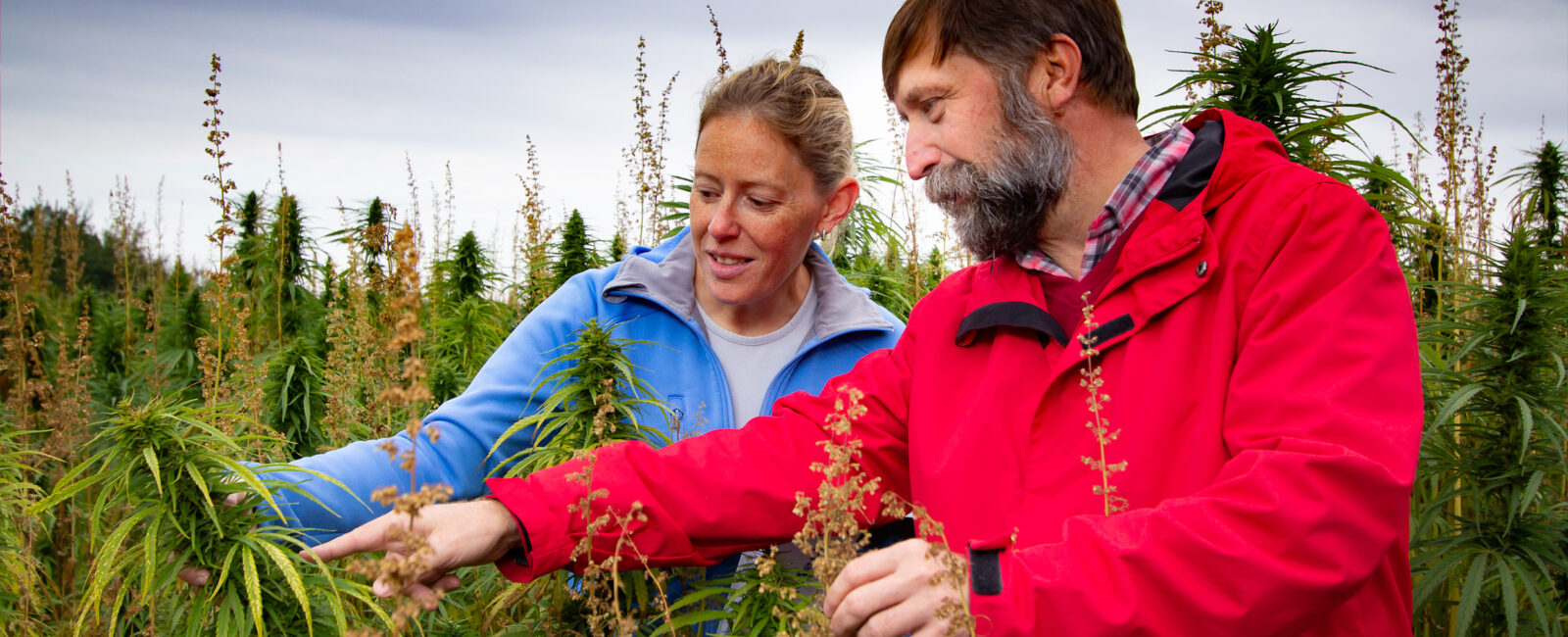
There is an intrinsic link between the Canadian Rockies Hemp Corporation (CRHC) and InnoTech Alberta as both names that come to mind whenever Alberta hemp is mentioned. Back when the CRHC was just an idea, before the debut of their hemp decortication technology or the opening of their dedicated hemp processing facility, InnoTech Alberta was there to help open the door for the nascent company—passing on their hemp knowledge, setting up introductions to relevant parties, and testing their technology. InnoTech has had a fundamental role in the development of hemp as burgeoning industry in Alberta, including in its working relationships with the industry’s key players. InnoTech’s experts keep a finger on the pulse of where hemp is going, focused on bridging the gap towards that future state through infrastructure, knowledge dissemination, and technology adoption, both within their own services and facilities and beyond.
Organizationally, a range of supports have been provided to CRHC through different programs and services, helping CRHC become established and then accelerating their growth through an umbrella of agriculture and sustainable materials offerings. InnoTech’s parent company, Alberta Innovates, has supported CRHC through their involvement in the TIER Economic Recovery Program with a contribution of $750,000. InnoTech Alberta has been instrumental in enabling CRHC’s success and continues to provide active support. At the very beginning of their journey, CRHC’s president attended InnoTech Alberta Field Day and expressed an interest in hemp fibre; Jan Slaski provided mentorship, introduced him to the industry, connected him with equipment suppliers, and assisted him with international contacts. Ahead of commercialization, InnoTech completed decortication work for them, and they continue to use an InnoTech hemp variety in their operations.
CRHC processes hemp at scale to create biomaterials for a sustainable future. Their Alberta-designed and built hemp decortication technology, known as long fibre decortication, is filling an essential gap in hemp processing, as current equipment is only able to handle fibres up to 24 inches. Reliable decortication technology is fundamental to the hemp industry’s viability, as the separation of fibres allows those fibres to be used to create industrial and consumer products.
CRHC’s unique approach to working with farmers addresses the lack of a reliable supply chain by supporting farmers through the growing process. Typically, hemp is planted as a rotation crop due to low demand. By contracting farmers to grow hemp as an alternative crop, they’re pioneering a planting and harvesting model that vertically integrates the supply chain model from seed to mill production. CRHC’s model provides local farmers with seeds to plant, and then CRHC takes responsibility for harvesting and transport, freeing up farmers to focus on other crops and decreasing the level of risk that they assume.
Another challenge faced by the hemp industry is consistent fibre specifications—many varieties are not suitable for high-quality fibre production. CRHC works with the Bio Processing Innovation Centre (BPIC) to do fibre testing to address this challenge. They also have exclusive rights to high-performing, resilient hemp genetics from the Institute of Base Crops in Ukraine, grown in Canada, supported by Results Driven Agriculture Research (RDAR).
In August, CRHC hosted a field and facility tour, intended to share updates on their progress with their core supporters, including a walkthrough of CRHC’s two decortication lines, hurd and packaging lines, and dust collection system. CRHC was excited to show off one of the best crops they’ve grown to date, with some plants reaching above 15 feet.
Their facility demonstrates stable progression following construction in 2019, completing Line 1 in 2021, and installing Line 2 in 2022 through the TIER funding contribution. Currently, Line 2 is being upgraded to operate with less downtime and improved quality. The company is also exploring the possibility of cottonized hemp fibre, produced without the chemical inputs used for traditional cotton and the associated negative environmental impacts.
The growth of the hemp industry in Alberta, driven by InnoTech Alberta, was a unifying theme emerging from the technology, processes, and expertise on display at CRHC, the manifestation of a legacy of collaborative efforts. If their towering new hemp crop is any indication, that growth is well underway.